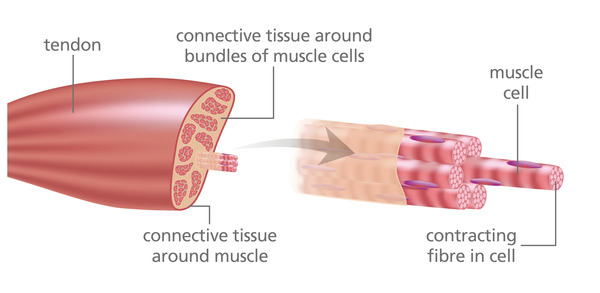Collagen Peptides are Known as Nature’s Building Blocks for Better Mobility
November 27, 2016
by: Kathleen Sullivan

Good Nutrition and Supplementation Maximize Mobility
A healthy, active lifestyle requires optimal bone and joint health. This can be achieved through better nutrition and supplementation with fortified products that boost nutrient intake. Protein is a major component of the bones, cartilage and muscles, it can be beneficial to include collagen peptides in everyday diets to support maximum mobility.
Supporting Mobility with Peptan Collagen Peptides
Peptan type 1 collagen peptides are obtained by a proprietary enzymatic hydrolysis of native collagen and contain a unique combination of 18 key amino acids and offer exceptional nutritional properties not found in other protein sources. Highly digestible and bioavailable, 90% of the collagen peptides are absorbed into the blood just a few hours after ingestion.1,7
Collagen Peptides for an Active Lifestyle
Collagen is the main structural component of the human body and represents almost 30% of its total protein. Responsible for holding together tissue, it is mostly found in connective tissues such as tendons and ligaments, as well as in joints, bones and skin. However, with time, the body’s ability to replenish collagen slowly decreases, resulting in the physical decline of the body’s tissues and organs. As a hydrolyzed form of collagen, collagen peptides are proven to have multiple benefits for bone and joint health. Collagen peptides are transported to the target tissues — through the bloodstream — where they accumulate and stimulate cells to produce collagen.1,2 These bioactive proteins have a number of positive effects on mobility, including providing connective tissue support, reducing joint discomfort and helping to improve bone mass density.

Collagen Peptides Improve Bone Health
Representing around 90% of its total organic bone mass, collagen is one of the key components of the musculoskeletal system and is responsible for bone strength and flexibility. Collagen peptides efficacy have been proven in numerous in vitro and in vivo studies supporting the forming and functioning of healthy bones.3,4 By inducing bone formation and inhibiting the rate of bone resorption, collagen peptides have been shown to have a positive effect on bone metabolism. Collagen acts as a structural component to which calcium and other minerals attach. In a recent in vivo study, collagen peptides have been shown to improve calcium absorption, retain high levels of calcium in bones, increase bone mineral density and preserve bone strength.5 
Improved Joint Mobility and Flexibility
Maintaining flexible joints is important to people of all ages, as it enables them to stay active and reduce the risk of injury. To achieve optimal joint function, it is important that joints receive the correct nutrients. Collagen peptides have been proven to be effective in improving joint functionality, including increased mobility and flexibility. A randomized, double-blind, placebo-controlled clinical study, using the WOMAC score system to measure the condition of participants with knee osteoarthritis, found that a daily intake of collagen peptides significantly reduced scores, with subjects recording an improvement of 32% in joint pain, 44% in stiffness and 22% in function.6
Protein Essentials Products are Peptan
Protein Essentials product line exclusively uses Peptan collagen. Protein Essentials with Peptan is sourced from pasture raised non GMO, 100% hydrolyzed collagen. Increase bone and joint health while increasing protein intake with delicious and nutritious InstaBroth or Chocolate and Mocha Shakes. 

1. S. Oesser, et al., “Oral Administration of 14C Labelled Gelatine Hydrolysate Leads to an Accumulation of Radioactivity in Cartilage of Mice (C57/BL),” Journal of Nutrition 129, 1891–1895 (1999).
2. S. Oesser and J. Seifert, “Stimulation of Type II Collagen Biosynthesis and Secretion in Bovine Chondrocytes Cultured with Degraded Collagen,” Cell Tissue Research 311, 393–399 (2003).
3. F. Guillerminet, et al., “Hydrolyzed Collagen Improves Bone Status and Prevents Bone Loss in Ovariectomized C3H/HeN Mice,” Osteoporosis International 23(7), 1909–1919 (2012).
4. F. Guillerminet, et al., “Collagen Peptides Improve Bone Metabolism and Biomechanical Parameters in Ovariectomized Mice: An In Vitro and In Vivo Study,” Bone 46(3), 827–834 (2010).
5. A. Daneault, et al., “Hydrolyzed Collagen Contributes to Osteoblast Differentiation In Vitro and Subsequent Bone Health In Vivo,” Osteoarthritis and Cartilage 22, S131 (2014).
6. J.X. Jiang, et al., “Collagen Peptides Improve Knee Osteoarthritis in Elderly Women,” Agro food Industry Hi Tech 25(2), 19–23 (2014).
7. S. Ichikawa, et al., “Hydroxyproline-Containing Dipeptides and Tripeptides Quantified at High Concentration in Human Blood After Oral Administration of Gelatine Hydrolysate,” International Journal of Food Sciences and Nutrition 61(1), 109 (2010).

